Research Article: 2023 Vol: 27 Issue: 1S
Analysis of the impact of the Ajman free zone employee services on the level of customers satisfaction
Kalpana Solanki, City University College
Citation Information: Solanki K. (2022). Analysis of the impact of the ajman free zone employee services on the level of customers satisfaction. International Journal of Entrepreneurship, 27(S1), 1-10.
Abstract
This research paper focuses on the impact of Ajman free zone employee’s performance on customer satisfaction and the challenges they might face in achieving both of customers and investors satisfaction. The main goal of the research paper is to analyse the role of Ajman free zone work practices and their employee’s performance on customers satisfaction which leads to retaining loyal customers. The literature review focus on articles related to service industry and its impact of customer services. The data collection in this research paper is done using primary method and secondary method. In primary data collection method interviews with Ajman free zone employees and surveys that were completed by approximately 40 customer of Ajman free zone customers were used .The secondary data collection method included -sources from internet and peer-reviewed journals and articles.
Introduction and Background
Ajman Free Zone was established in 1988, leading to massive industrial development in Ajman by attracting a great number of companies” (Ajman Free Zone, 2015), their mission is “Ajman Free Zone encourage investing capitals, and provide the appropriate climate for such investment, by way of contributing in drawing up the general policies and providing information, preparing studies, executing projects, organizing expositions and conferences, and other constructive activities, and by the help of national efforts and qualified human cadres, who contribute in achieving the economic growth and the welfare of Ajman's Society and that of the United Arab Emirates.” (Ajman Free Zone, 2015)
Ajman Free zone is an organisation which provides companies business services. It’s a zone where goods can be landed and exported, also they help investors to open their businesses. “Ajman Free zone is created in order to boost the international business with 100% ownership of expatriates and companies are free from imports and exports duties. Free zones either located in ports or in a specific area of the country.” (UAE free zones , 2017).
Swot Analysis
| SWOT analysis | |
|---|---|
| Strengths | Weaknesses |
| 1.100% foreign ownership of many categories of business is allowed | 1.Lack of organizations innovation |
| 2.“Strong strategic and geographic location” | 2.Hard to interact with the UAE market directly |
| 3.Free zones have played an instrumental role in attracting manufacturing industries | 3.Lots of regulations and documents needed |
| 4.Legal structure and political stability of the area | 4.Focusing on importing rather than domestic production |
| Opportunities: | Threats: |
| 1.Creating jobs and entrepreneurship | 1.Lots of free zones in other 7 emirates |
| 2.Unique tourist attraction | 2.Economic and cultural changes |
| 3.Economic and cultural interaction | 3.Indirect interact with the local customers |
| 4.Gaining international trade relations | 4.Challenges of dealing with different nationalities |
Research problem
The main problem is to identify the reasons responsible for the customers dissatisfaction in the Ajman Free Zone.
Research Objectives
1. Analysing the role of Ajman free zone employees on customers awareness about Ajman free zone services
2. Employees performance and their effect on investors satisfaction
Literature Review
Customer awareness is how well customers know about the company values and believes by identifying the organizational ethics and rules. The company needs to categorize themselves under a category that directly customers will look for when they need to identify the company.
Self-image also helps the customers to be aware about the company zones and their employees’ job so it is important to all organizations to have customer awareness to be identified easily. (Chaudary, 2016)
As customers are different, they also have different levels of satisfaction which means the organization should always take care of their employees to make them love their job and happy about it so they can perform well with their customers.
Word of mouth, feedback to the supplier and loyalty are the three different levels of satisfaction that need to be done to make sure that the company is in the right track. (Soderlund, 2016)
Under high pressure employees get stressed which affects the way they work and then they must change themselves.
The organization should make trainings for their employees about how to get better performance under work pressure and how to control their emotions in the work environment this type of solution is difficult and needs patience and time. (Wan, 2012)
Methodology-data collection
The main types of data collection methods used in this research are Primary and secondary data collection. This research paper includes interviews with Ajman Free Zone employees, a survey using a questionnaire
Survey analysis
The number of responses for the survey was 40 responses. The survey results for the questions showed that 35% of people are satisfied about Ajman free zone employees performance and only 12.5% said that they are not satisfied which makes the majority is happy and satisfied but in the other hand, in response to another question 37.5% said that employees need training for a month and 32.5% said that employees need training for 1-3 weeks which means even they are satisfied about their performance they also think that employees need more trainings to improve their skills as it shows in the response to next question that the most challenges and difficulties that might employees face during their work is technological skills by 63% of all different types of difficulties because every company and organization do changes in their systems which distracts the employees so they need to get trainings every time the changes in the system happens. Another response showed that customers are not very well known about Ajman free zone services they are not aware as the results shows that 27.5% are neutral and 17.5% are not aware about Ajman free zone services which means the company needs to make improvements on customer awareness side to get more satisfied customers, also the next response showed that customers prefer to know about the new services that the company provide through social media.
Interview analysis
The interview with the employees of Ajman free zone revealed that they have received all types of trainings that help them improve the job-related skills in customer services and to make the customers satisfied they are transferred directly to concerned department so they can solve their problems from the roots. The company has a huge role in customer awareness they should always improve the way they reach to their customers to make them aware about their services. It was found that the main challenge that the employees face in their job is technological challenges, these happen in the company online system which makes the process of getting the work done harder and takes more time which makes the customer angry of waiting a lot until their work gets done. Furthermore it was found that the employees performance has a huge effect on customers satisfaction this means the company should always get their employees in trainings that will improve their job performance and to increase their ability to deal with the job challenges, performance improvement leads to customers satisfaction but also employees need to be satisfied and happy so they can love their job and feel happy to help the customers so Ajman free zone should also give bonuses and promotions to their employees because the results of the interview and the survey showed that these are the main reasons that leads to employees and customers satisfaction which also leads to the excellence of the company job comparing to other companies.
Findings
The relationship between the research objectives and findings are as follows-
As Ajman free zone deals with different nationalities of customers and investors inside and outside the zone it is important for them make their customers from all nationalities aware about the company, In order to make their customer aware about the company values, believes, ethics and rules they have to make consideration about the culture differences and the language differences having these differences means the employees are dealing with different perspectives and different ways of thinking, so the company must put a plan to make programs and to train their employees how to reach the customers based on their language how to talk to them .Ajman free zone should explain to their customers the services and policies to avoid the misunderstanding and to achieve the better performance of the company. There is a huge positive relationship between Ajman free zone and their customers because of the good communication between the employees and the customers another factor is online information available on the company website.
Limitations of this research
The first limitation was using two types of data collecting methods both of primary data and secondary data, it was challenging to find lots of trusted information in a short period of time from the employees in Ajman free zone as they were busy, and no one was answering me until I visited the company.
Recommendation
1. Ajman free zone should focus on continuously delivering the training programs for their employees such as awareness program in order to achieve higher customer awareness and customer satisfaction.
2. Ajman free zone should train their employees to improve their technical skills
3. Ajman free zone should categories their customers to get better communications direct and indirect with the customers and to build a company image in the UAE business sector.
4. Reduce the customer effort of visiting the company by providing updated online information in the company website.
Conclusion
This research paper found after evaluating the services offered by the Ajman free zone are their relationship with their customers satisfaction that Ajman free zone is doing well but they need to continuously improve some areas such employees skills to remain competitive(Figure 1 to Figure 10).
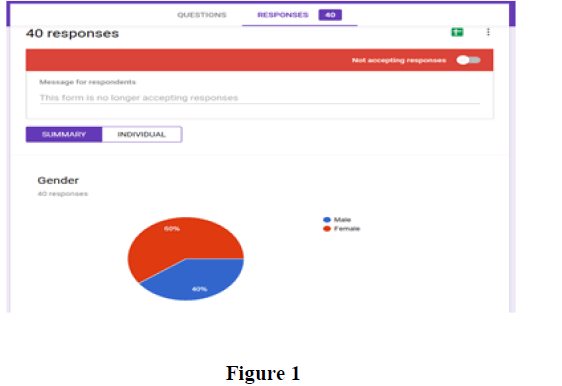
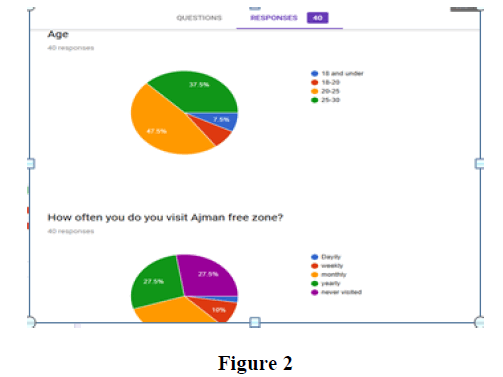
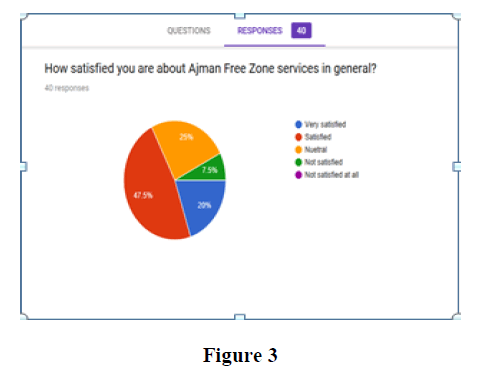
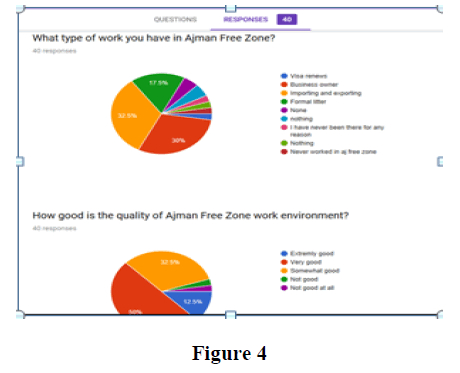
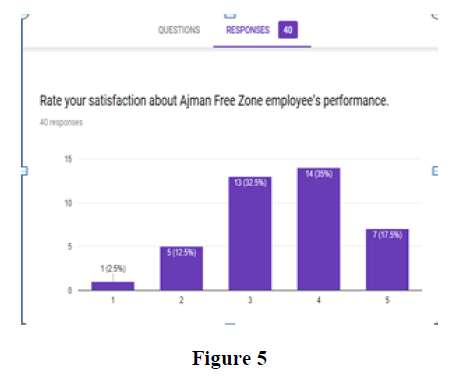
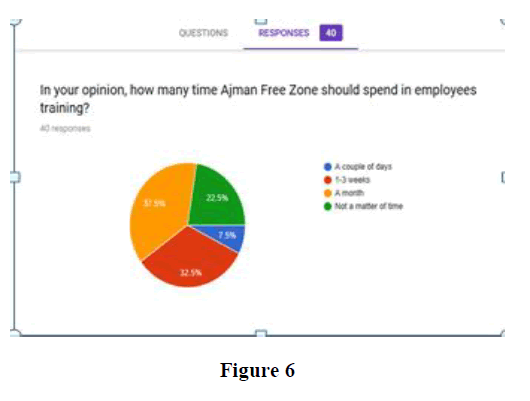
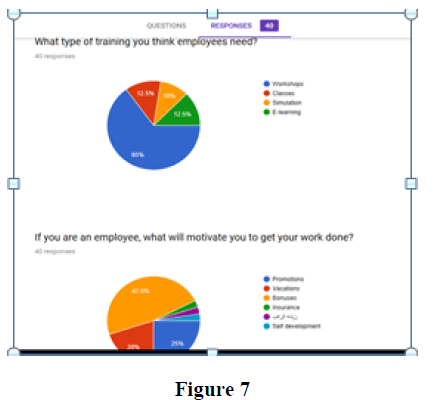
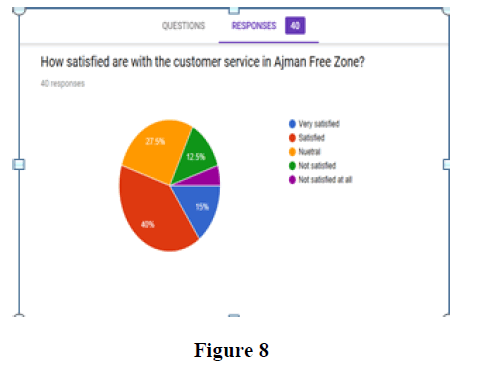
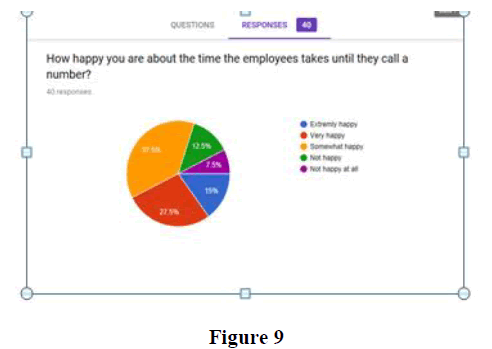
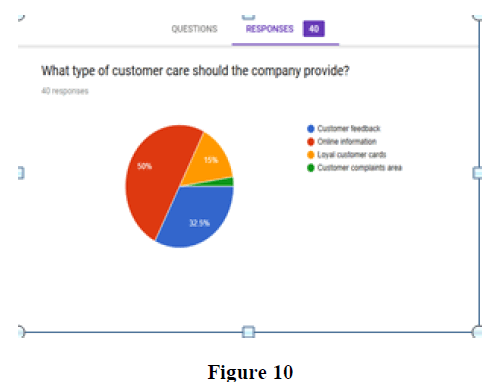
References
Bedah, H. (2018). Customer happiness executive. ( Interviewer)
Chan, K. W., & Wan, E. W. (2012). How can stressed employees deliver better customer service? The underlying self-regulation depletion mechanism.Journal of Marketing,76(1), 119-137.
Indexed at, Google Scholar, Cross Ref
Chaudary, S. (2016). The Role of Customer-Company Identification with the Moderating Effect of Awareness, 370-371.
Conrad, D., Domeisen, N., de Sousa, P., & Schmid, L. (2005, April). Trade in Services: Awareness, The first step. InInternational Trade Forum(No. 2, p. 20). International Trade Centre.
Cox, J. H. (2016). Smart Training and Development: A Learner?Guided Approach.Performance Improvement,55(5), 6-9.
Indexed at, Google Scholar, Cross Ref
http://www.chegg.com/homework-help/definitions/sampling-methods-31
http://www.digitalistmag.com/customer-experience/2016/01/08/customer-awareness-customer-care-03927798
http://www.uaefreezones.com/uae_freezones.html
https://www.ameyo.com/blog/customer-satisfaction-quotes
https://www.cleverism.com/lexicon/customer-awareness/
https://www.enotes.com/homework-help/what-primary-data-secondary-data-472774
https://www.managementstudyguide.com/qualitative-and-quantitative-research.htm
Issacson, W. (2011). Steve jobs by Walter Issacson. In W. Issacson, Steve jobs by Walter Issacson.
Lee, S., & Cho, Y. C. (2016). Investigating the Performance and Customer Satisfaction on Free Economic Zone?.Journal of Marketing thought,3(2), 39-48.
Matzler, K. (2004, May). ScienceDirect. Retrieved from Industrial marketing management .
Netemeyer, R. G., Maxham III, J. G., & Pullig, C. (2005). Conflicts in the work–family interface: Links to job stress, customer service employee performance, and customer purchase intent.Journal of marketing,69(2), 130-143.
Indexed at, Google Scholar, Cross Ref
Sharma, J. J. (2012). Impact of Market Orientation on Business Performance: Role of Employee Satisfaction and Customer Satisfaction. 298-299.
Received: 19-Sep-2023, Manuscript No. IJE-22-12571; Editor assigned: 23-Oct-2023, PreQC No. IJE-22-12571(PQ); Reviewed: 10-Oct-2023, QC No. IJE-22-12571; Revised: 14-Oct-2023, Manuscript No. IJE-22-12571(R); Published: 21-Oct-2023